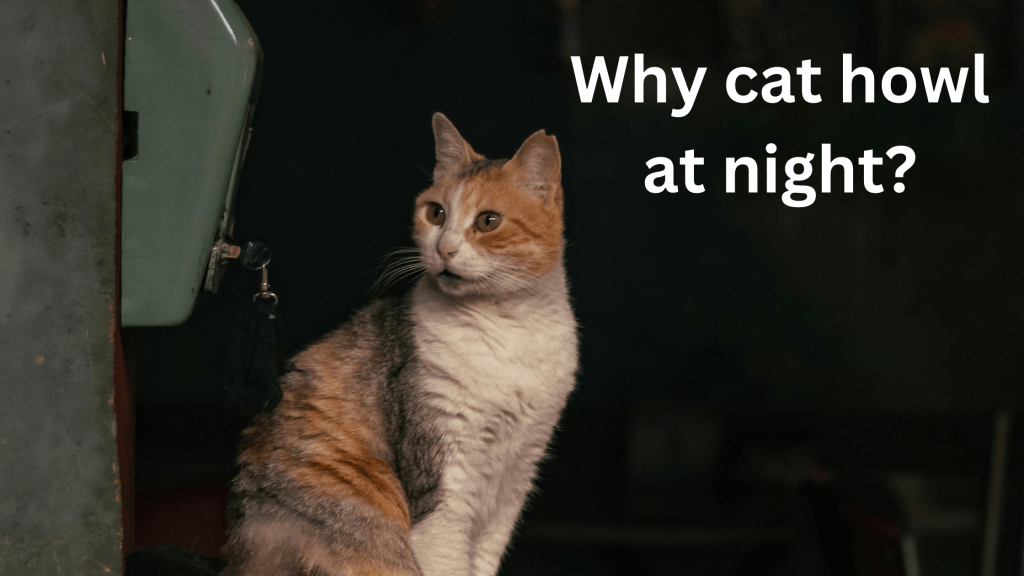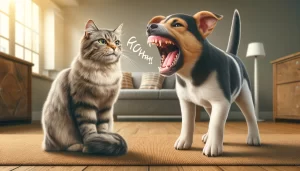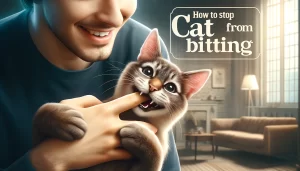Introduction:
Why do cats howl at night? it is a common question. Our cherished furry friends, cats, frequently display enigmatic behaviours that pique our curiosity and occasionally confound us. Their propensity to wail at night is one of these behaviours, which has long baffled cat owners. We go into great detail on the causes of this nocturnal vocalisation in this blog post, illuminating the different elements that could influence this behaviour.
Knowing the Nature of Cats: It’s important to comprehend the nature of these mysterious animals before delving into the causes of cats’ nocturnal howling. Being crepuscular creatures, cats are most active at dawn and dusk. Their innate hunting instincts led to this evolutionary adaption because these are the best times to stalk prey.

1: The Mystery Unraveled ( why do cats howl at night)
.) Decoding the Howls
Cats are recognised for their vocalisations, which include growls, hisses, and purrs and meows. But what’s most interesting is the characteristic howling that’s frequently heard at night. In complete contrast to their meows during the day, which are frequently used for communication or attention-seeking, cats scream at night for absolutely different reasons.
2: Communication and Territory
.) Vocalizing Their Presence
Cats communicating with other cats at night could be one reason for their wailing. Cats in the wild mark out their territory and interact with possible partners using vocalisations. Similar to this, domestic cats may howl at night to annoy anyone who might try to disturb them.
.)Seeking Companionship
Another aspect of cats’ nocturnal howling may be their desire for companionship. Cats are social animals to some extent, and they may vocalize at night as a means of seeking the company of their owners or fellow felines. This behavior is especially common in single-cat households or in cats that have recently experienced changes in their environment.
.) Effects of Hormones
Cats’ vocalizations at night may also be caused by hormonal shifts, especially in those who are not neutered or spayed. Unneutered male cats may scream in reaction to the scent of a nearby female in estrus, while female cats in heat may yowl loudly to attract possible mates. These hormonal swings might cause cats to vocalize more in multi-cat households as they compete for attention or dominance.
3: Health-Related Issues
.) Fundamental Health Concerns
Excessive wailing at night might often be a sign of a medical problem. Painted or uncomfortable cats—such as those with arthritis, dental issues, or gastrointestinal disorders—may vocalize more often, especially after dark when their attention is less diverted. Furthermore, disorientation or agitation brought on by cognitive impairment in elderly cats, such as dementia, might result in an increase in nighttime vocalizations.
.) Sensory Alterations with Aging
Cats may have changes in their sensory perception with age, such as hearing and visual impairments. Cats that become confused or nervous in low light may vocalize at night as a result of these age-related changes. Adding extra environmental enrichment, such calming music or nightlights, can assist ease their discomfort and lessen their wailing at night.
4: Handling Howling at Night
.) Techniques for Behavioral Modification
You have a few options for dealing with your cat’s midnight howling if it starts to bother you or cause you concern. Regular play and physical activity during the day can help relieve boredom and lessen restlessness at night. Establishing a regular evening schedule that includes playtime and feeding followed by calm relaxation will also assist in letting your cat know when it’s time to turn in for the night.
.) A Veterinarian Consultation
See your veterinarian to rule out any underlying medical issues if your cat continues to wail at night despite behavioral efforts. In order to detect any possible health issues and suggest the best course of action, your veterinarian can do a comprehensive checkup. Sometimes, veterinarians prescribe medicine to control pain.
In conclusion (why do cats howl at night):
Cats’ howling at night is a complicated activity that is regulated by a range of elements, such as hormonal fluctuations, environmental cues, communication, and medical concerns. Through comprehension of the fundamental causes of this behavior and use of suitable remedies, cat owners may guarantee their feline friends have restful sleep and maximum health.



